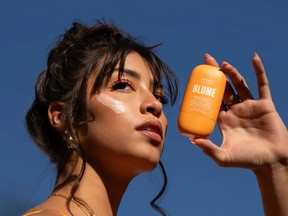Article content
The question is whether the trade war will enable growth in the sector in Canada or hinder it.
Article content
Trade association Cosmetics Alliance Canada identified about 60 Canadian brands within the sector, with most being small- to mid-sized companies.
Article content
“Their market share today is not anywhere near that of the big brands, but there are certainly opportunities for them to grow,” said Darren Praznik, the organization’s president and chief executive. “And certainly retailers are expressing a greater interest in them.”
Article content
Vancouver-headquartered skincare company Elleboxco Inc., operating as Blume, has seen a dramatic surge in Canadian sales, including through its various retail partners, such as Sephora Canada and Amazon.com Inc., according to its founders Bunny and Taran Ghatrora. The venture-backed company, which launched in 2018 and has raised more than $3 million according to Osler, Hoskin & Harcourt LLP, is on pace for eight-figure revenues this fiscal year, Bunny Ghatrora said.
Article content
Blume’s Canadian sales have grown 35 per cent year-over-year so far in 2025, with 25 per cent growth overall, the company said.
Article content
Article content

Article content
Still, despite swelling demand from local buyers, Canadian beauty companies aren’t immune to the negative consequences of a trade war. Smaller brands are particularly vulnerable, especially if they depend on U.S. sales.
Article content
“A Canadian business cannot survive without the U.S. market,” Cheekbone’s Harper said. “We need the U.S. consumer.”
Article content
Canadian beauty firms can face higher costs associated with manufacturing their products as well, since many ingredients and packaging components cannot be sourced locally.
Article content
Blume, for example, uses German chamomile flower as one of its product’s ingredients and sources bottles and droppers from China.
Article content
“The cosmetic industry is probably one of the most internationally integrated,” said Cosmetic Alliance’s Praznik. “They manufacture and distribute and sell their products in supply and distribution chains that are like a web around the world.”
Article content
In fact, many small Canadian-owned brands looking to grow and expand internationally often end up getting bought out by large American companies that can operate on a bigger scale. Examples include Toronto-founded MAC Cosmetics Inc. and skincare company DECIEM Inc., owner of brands such as The Ordinary, both acquired by The Estée Lauder Companies Inc.
Article content
Article content
“Our industry has been very supportive of free trade around the world and that is because it has meant great efficiencies in production,” Praznik said, citing benefits from better quality and less expensive products to more options for the consumer. “So, everyone has benefited.”
Article content
As Canadian cosmetics companies grapple with the fallout from tariffs, they are weighing a variety of strategies.
Article content
Article content
While Blume has primarily focused on North American sales, the Ghatrora sisters said the trade war has prompted them to more seriously consider expanding to countries such as the United Kingdom and Australia to diversify the company’s customer base.
Article content
Praznik said some Canadian manufacturers are evaluating whether they can import Chinese-made components directly to Vancouver and not via the U.S.
Article content
Others are looking into using custom manufacturers in other countries to make certain products and avoid tariffs. For instance, one option would be to make a product for the U.S. market in the U.S., while manufacturing products for Canadians and other countries in Canada, Praznik said.

.jpg) 6 hours ago
1
6 hours ago
1
 English (US)
English (US)